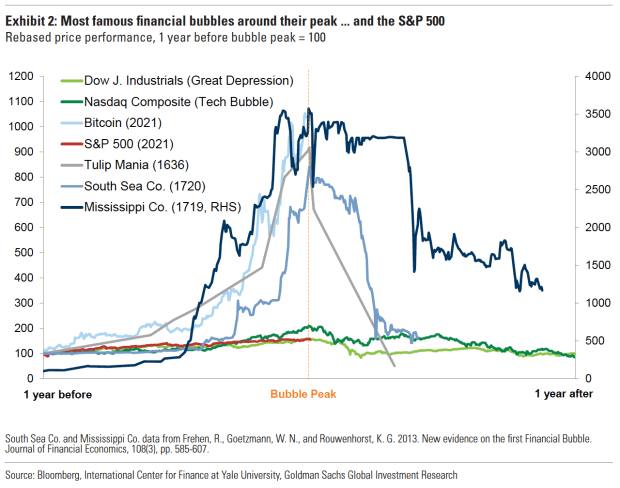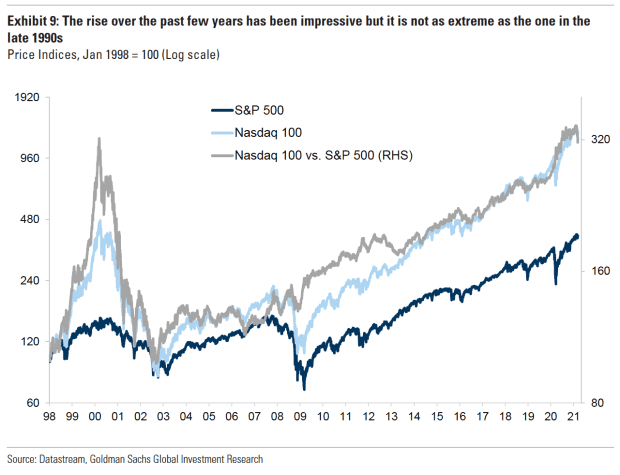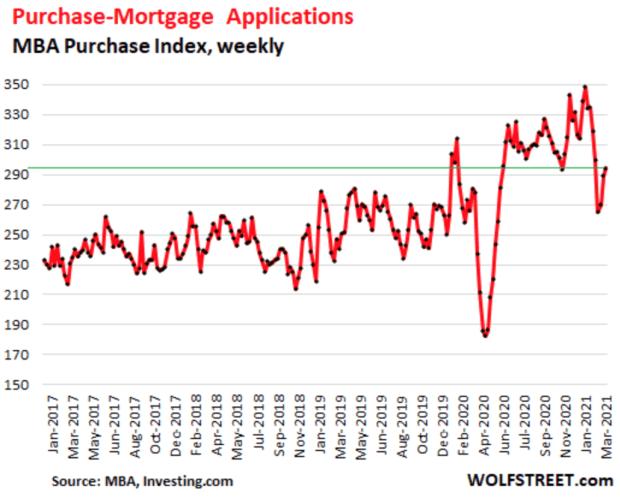This post was originally published on this site
The bull rally in stocks continues to paw at the dirt, with both the Dow and S&P 500 indexes charging to new highs last week and momentum set to continue into the week ahead.
And worries of a bubble are blowing. Earlier this month, China’s top banking regulator warned that Wall Street assets were trading at such high levels that they are bound to correct.
But stocks aren’t in a bubble, according to Goldman Sachs
GS,
In our call of the day, analysts led by Peter Oppenheimer outline nine key characteristics of historic bubbles and discuss how they don’t match the current market environment.
The investment bank defines a stock market bubble as a “rapid acceleration in prices and valuations that makes an unrealistic claim on future growth and returns.”
Goldman Sachs’ study is based on historical stock bubbles, including the “Tulip Mania” in the Netherlands in the 1630s, the 1873 “Railway Bubble” in the U.S., and the 1990s global technology bubble.

One of the key hallmarks of bubbles is excessive price appreciation and extreme valuations. And while the investment bank acknowledges “pockets of exuberance,” and some excessive price rises in U.S. equities, the analysts argue that it doesn’t necessarily mean that a broader and “systemically dangerous” bubble is forming. The recent rise in the S&P 500 index, and particularly in the technology sector, is impressive but not extreme, the analysts say.
Similarly, another bubble telltale is the idea that “this time is different,” with a narrative that justifies new ways of valuing companies. But, the Goldman Sachs analysts argue, this time isn’t different, and the main argument supporting higher prices right now is mainstream: Interest rates are low.

Past bubbles have often included excitement around a particular sector leading to market concentration. And it is true that the group of FAAMG stocks — Facebook
FB,
Apple
AAPL,
Amazon
AMZN,
Microsoft
MSFT,
and Google, owned by Alphabet
GOOGL,
— representing Big Tech has come to dominate indexes and investor attention.
But the analysts argue that not only is this representative of a transformative period in technology, but the fundamentals back these companies up. The groups are highly cash-generative, and metrics like earnings per share in Big Tech and other retail investor favorites “have significantly outstripped those of the rest of the market.”
The investment bank also finds that while the current market has some characteristics of bubbles, like frantic speculation, easy credit and rising leverage, booming corporate activity, and “new era” narrative driving a tech boom, these factors were mitigated by forces including regulation and stability in the wider market. We’re also not late in an economic cycle and widespread accounting scandals haven’t come to light — these are other critical markers of bubbles.
Goldman Sachs’ findings are summarized in the table below:

The analysts conclude: “While there are pockets of excessive valuations in equities, and parts of the market are justifiably derating as interest rates adjust, in our assessment only a few of these common characteristics are currently present or being partially met.”
According to Goldman Sachs, the risks of an imminent bubble “with systemic risks to the financial system and economies” is relatively low.
The buzz
The Turkish
TRYUSD,
lira crashed as much as 15% against the U.S. dollar after President Recep Erdoğan sacked the country’s central bank chief, Naci Ağbal, after just four months on the job. The central bank raised interest rates by 2% last week and Ağbal has been credited with pulling the lira back from historic lows.
It is a light day on the economic front, but existing home sales data for February are due at 10 a.m. Eastern.
Asset manager Apollo Global Management
APO,
said chief executive Leon Black has been replaced by the group’s co-founder, Marc Rowan, and that Black’s role as non-executive chair of the board has been taken up by Jay Clayton.
AstraZeneca
AZN,
said its COVID-19 vaccine was safe and 79% effective in U.S. clinical trials, with 100% efficacy at preventing severe disease and hospitalization from COVID-19. The pharmaceutical and biotechnology company is preparing to submit findings to the Food and Drug Administration for Emergency Use Authorization.
Canadian Pacific Railway
CP,
agreed to acquire Kansas City Southern
KSU,
The merger, announced Sunday, is valued at about $25 billion, and would create the first freight rail network linking Canada, the U.S., and Mexico.
The founder and chief executive of the restaurant chain Texas Roadhouse
TXRH,
died by suicide. Kent Taylor’s family and the company confirmed Sunday that he took his own life after suffering from symptoms related to COVID-19, including severe tinnitus — ringing or other noises in one or both ears.
Beeple calls bubble. The digital artist Beeple, who sold one of his works for $69 million as a nonfungible token, or NFT, said on Fox News Sunday that NFT art is “absolutely” in a bubble.
The markets
Stock markets look ready to continue the momentum from last week, though Dow futures
YM00,
are pointing down slightly, while the S&P 500
ES00,
and Nasdaq
NQ00,
are set to open in the green.
European markets were mixed
UKX,
PX1,
while Asian markets
NIK,
SHCOMP,
largely finished the day in the red.
The chart

The housing market remains red-hot, but there are signs that higher mortgage rates are bringing things closer to a simmer. Our chart of the day, from Wolf Richter at the popular Wolf Street financial blog, shows that mortgage applications to purchase a home have declined from the January peak. Mortgage rates are slowly tracking higher, along with bond yields, though they remain historically low.
Random reads
A Pennsylvania prosecutor was demoted because he was caught moonlighting for food delivery platform DoorDash during work hours.
‘Worst mice plague in decades’ swarms across southeastern Australia as three hospital patients are bitten.
Need to Know starts early and is updated until the opening bell, but sign up here to get it delivered once to your email box. The emailed version will be sent out at about 7:30 a.m. Eastern.
Want more for the day ahead? Sign up for The Barron’s Daily, a morning briefing for investors, including exclusive commentary from Barron’s and MarketWatch writers.

